Nowadays, soundboard software is commonly used in the music industry, TV shows, stage shows, and radio stations, among other places. With a few quick clicks, you can add background sounds to your music, recordings, calls, or any live shows. You may use pre-made sounds or make your own recordings for the sounds. Some software has a palette feature, which allows you to store several sounds in the palette and play any sound with a single click from the palette. You may also use the program to add sounds to your live calls on Skype, Viber, PUBG, DOTA, and other live-calling apps. This software is being used.
You can conveniently assign specific sound samples to on-screen buttons or hotkeys to play them using this app. Furthermore, you can combine audio samples by playing several sound samples at the same time. You can also incorporate the microphone feed with sound samples in some applications to add your voice with sound samples. Some of these soundboards also enable you to give on-screen buttons names to make them easier to recognize. These programs also support the MP3 and WAV audio file formats, which is a nice feature.
What Does a Sound Board Do?
Simply put, a soundboard (also known as a mixing board or mixer) combines various input signals—such as microphones, instruments, iPods, DJ turntables, and so on—into a single signal that can be sent to speakers.
Each input channel must combine harmoniously to create a well-balanced sound, which is the task of an audio engineer. They use a soundboard to change input levels, add effects, equalize, and dynamically process the combined sounds.
ESSENTIAL ELEMENTS
Inputs: These are the jacks or plug-ins where all of the sound sources are connected. Audio signals usually input through an XLR, 1/4″ TRS, or RCA jack, which are the most common and normal audio inputs.
Channel EQs: Each input sound source is assigned to a channel, with EQ potentiometers on each channel. This enables an audio engineer to independently control the frequency balance of a sound source.
Auxiliary Channels: Also known as “aux channels,” these allow you to send a duplicate feed of a channel or input signal to other devices. A jack on the top or back of the soundboard outputs the redundant feeds from the aux channels. During concerts, a band member may choose to hear the audio back from their own dedicated display wedge or IEM with certain elements tailored to their preference (in-ear monitors).
Best Free Soundboard Software
1. EXP Soundboard
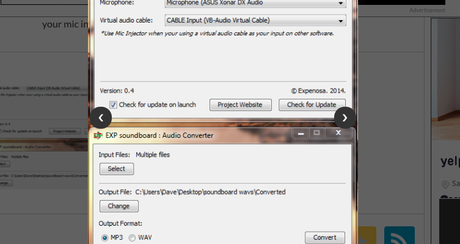
Main Characteristics:
- The Sound Clip and Hotkeys section is the main section of this program, where you can load audio files and add hotkeys to them. Following the loading of audio files, you can use it to pick and play any audio.
- Output: This program has two output parts that allow you to allocate output audio to two separate devices, such as speakers, virtual devices (audio programs, streaming services, and so on), and so on.
- Audio Levels: You can use it to adjust the volume of output devices and the gain of the input microphone.
Other features include:
- Audio Converter: You can use it to convert audio files of different formats to MP3 or WAV format.
- After you’ve imported audio files and assigned hotkeys to audio samples, you can use this function to save all of your settings in a soundboard file format.
Final Thoughts:
It’s yet another free open source soundboard program that lets you use hotkeys to quickly play specific audio samples.
2. Twitch Sound Board Interface
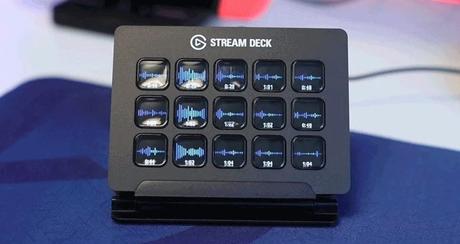
Main Characteristics:
- Edit Libraries: This program has several libraries that you can use to load audio files (MP3 and WAV), images (JPG, GIF, PNG, BMP, TIFF, ICO, EMF, and WMF), video files (MP4), and web pages (URL Links).
- Programmable Buttons: This feature allows you to build custom hotkeys for playing or viewing media files, images, and webpages.
- On-Screen Buttons: You can allocate several on-screen buttons to play specific media, webpages, and images with this app.
- Sound+Image Library: This is a one-of-a-kind library that allows you to mix images and sounds to play audio while displaying an attached image or animated GIF file.
Another essential feature of this program is the Streamer Window, which plays media (video and radio files) and displays web pages on its gui.
Final Thoughts:
It is a simple and feature-rich open source soundboard app that can be used to stream and play high-quality sound, videos, images, and webpages.
3. soundboard
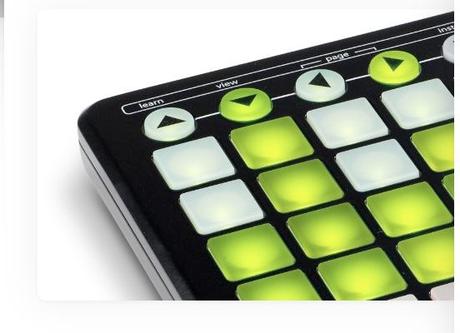
Main Characteristics:
- On-Screen Buttons: You can allocate different audio to each on-screen button. After you’ve assigned audio to each button, all you have to do now is press one or more buttons to play audio and move from one assigned audio to another.
- Loop: This is a useful method that allows you to play a single sound sample indefinitely.
Shift the audio intensity of the game by adjusting the volume. - Volume: Adjusts the audio volume of the currently playing audio.
Other features include:
Open and Load Profiles: You can load a prebuilt profile and save an existing profile in XML format using these features.
Final Thoughts:
It’s a simple open-source soundboard app that lets you play and turn between a variety of sounds.
4. Silica Interactive Soundboard
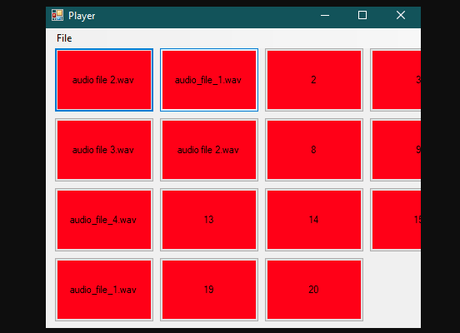
Silica Interactive SoundBoard is a downloadable, open-source, portable soundboard for Windows. It’s also a Java-based soundboard where you can allocate several buttons to different audio samples. This app comes with only one programmable button, which you can rename and assign a sound to. Later on, you can customize this program by adding as many buttons as you like.
Main Characteristics:
- Add a button and Add several Buttons: These choices can be found in the software’s right-click menu. You may use them to connect one or more programmable buttons to the software’s interface.
- Choose a new song and enter the following text: You can control the new song and text functionality by pressing the right mouse button over a programmable button. You can use these features to allocate audio (WAV) and text to the selected button after you’ve accessed them.
- Bind this button to a key: You may allocate a keyboard shortcut key to operate any on-screen button using this function. It allows you to switch between sound samples easily without having to use the on-screen keys.
Limitation:
The software’s save and save as functionality did not function during my research.
Final Thoughts:
It’s another simple open-source soundboard program for easily playing and switching between different sound samples.
5. Da Soundboard
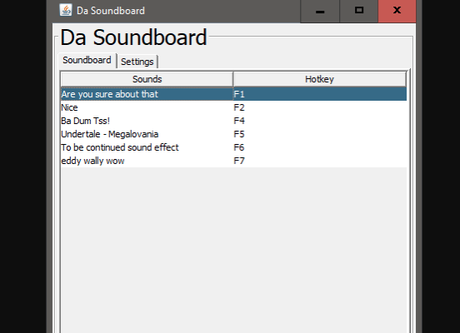
Main Characteristics:
- You may use it to add several sound samples to this program.
Edit: After you’ve added sound samples, use the Edit function to give each one its own hotkey. - On-Screen Controls: This program includes on-screen controls such as play, stop everything, navigate up and down, and tools to play/pause and turn between playing music.
Additional features include an audio system menu that allows you to adjust the output audio device or software, such as physical speakers or audio programs.
Final Thoughts:
This open-source audio soundboard program is easy to use and allows everyone to easily move between audio samples using assigned hotkeys.
6. Mixere
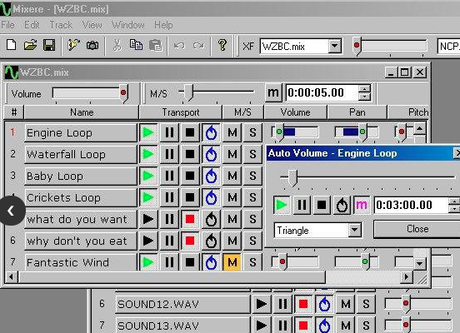
Finally on the list is Mixere, a free open source soundboard app for Windows. Its name means that it is primarily used to combine multiple sound samples in various formats such as OGG, MP3, AIFF, WAV, and others.
You can also use it as a soundboard since it allows you to allocate different sounds to separate tracks that can be played separately from the interface.
You can use the media controls on each track of this program to play/pause sound tones, change the sound volume, and so on. Now, let’s take a look at the key features of this soundboard program.
Main Characteristics:
- Tracks: This app includes 64 different tracks, totaling 64 distinct sounds that you can play using the track’s media controls. If you want to combine sounds, you can play several tracks at once.
- You can play sounds associated with a playlist, adjust audio pitch, adjust audio location, adjust audio balance, play audio in a loop, and adjust audio volume using media controls.
- Multi-Window Gui: With the multi-window interface, you can open and manage multiple Mixer windows with up to 64 tracks each.
- You can save the project in Mixer (.mix) file format after assigning beats and sounds to tracks so you can remember it later.
Final Thoughts
It’s a good soundboard program that lets you make your own soundboard and play different sound beats. The only thing missing are hotkeys.
Wrapping it up
So here we’ve compiled a list of the best open-source soundboard applications for Windows. These open-source soundboard programs are totally free, and their source code can be viewed and edited.

